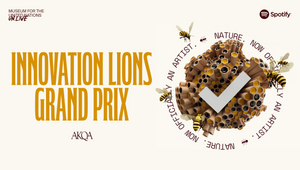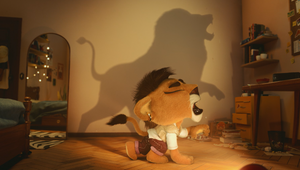
How to Survive the End of Advertising As We Know It

Digital has bestowed advertising agencies with all sorts of unprecedented opportunities over the past ten years, but it may also be the thing that fundamentally transforms or even destroys them. LBB’s Gabrielle Lott caught up with AKQA’s Rei Inamoto at Spikes Asia to find out what the future holds.
LBB> Talk to us about your presentation yesterday.
RI> The main theme was ‘failure’. A lot of the presentations that are given at these conferences tend to be success stories and, obviously, award shows celebrate successes. Looking at successes is useful and there’s a lot to learn from them but failure is a much bigger learning experience that makes you grow more. There is nobody that has succeeded without failing.
That was one side of it. The other side of it was based around evolution and upcoming stages of advertising and marketing. A lot of people have been talking about change and the effects of digital, which is all well and good, but I like to explore other changes and the shifts that we need to make as an industry, more specifically.
LBB> What from your presentation do you feel really applies to Asia Pacific as a region? And what do you see as the differences between here and the West?
RI> I don't claim to think that my presentation answered all of the questions that people may have had, but part of what I wanted people to take away was to constantly ask the question, ‘what business are we really in?’ Whether you’re on the agency or client side we should be constantly that.
Also, regardless of region, there were three fundamental shifts that happened over the past five to ten years. One: businesses are being replaced by communities. Two: humans are being replaced by machines. Three: physical being replaced by digital.
Whether you are in the USA, Europe, Africa or Latin America, those three things are inevitable and unavoidable. Different countries and different regions might be at a different stage in their evolution, but I think that every industry needs to be ready. Any business that has an agent in it will, I think, be replaced. For example, real estate agencies used to be a booming business but because of online and radical transparency, people now have access to far more information about real than they used to. I remember in the late ‘90s when I first moved to New York, the process of looking for an apartment was very analogue. You’d look in a newspaper and call the agent for a viewing. Now it’s all online and can be done directly with the landlord, bypassing the agent. In relation to advertising, agencies are the agents for clients and media properties, and I think, slowly but surely, these things are being replaced by other means.
LBB> How do you apply that to AKQA and the work the network creates?
RI> One thing that comes to mind is the Nike+ Connect. That’s an example of how physical is being replaced by digital and humans are being replaced by machines. Going to a gym and being trained by a trainer is a fairly common activity. But now with Nike+ Connect, you can do all of that at home – it is a virtual trainer without the monthly gym membership charge. You pay a one off fee for a virtual trainer that is almost as good as a human trainer. They are being replaced by software and machines.
LBB> Do you not think, though, that there might be a resurgence of people wanting to connect in a physical sense?
RI> Absolutely. It’s coming full circle. A lot of things are being digitised, but now digital is enabling physicality and tangibility – for example the 3D printer. 3D designs are being digitised and then turned into physical things.
I’m not sure about other places, but in the States in the past couple of years, the ‘maker’ movement has been growing. There are ‘maker’ studios popping up and people are signing up to use them and make physical things. I don’t know if that is a reaction or answer to this increasingly digitised world, but I think there is definitely a hunger for it.
LBB> Do you think it’s because we’ve become a bit more savvy to how and where digital should play a role in our lives?
RI> I think that as with anything, curation is quite important. When there is saturation, curation can step in and provide more meaningful content. I do use Facebook, but at the same time I get really mixed feelings every time I open it. On one hand I feel like I am in touch with people’s lives, but then there are 10 photos of somebody’s breakfast and lunch followed by photos of people’s babies and ‘scenic’ instagrammed sky shots. I use Facebook as a kind of candy for my brain – it’s entertaining for a little bit, but then I kind of regret it!















